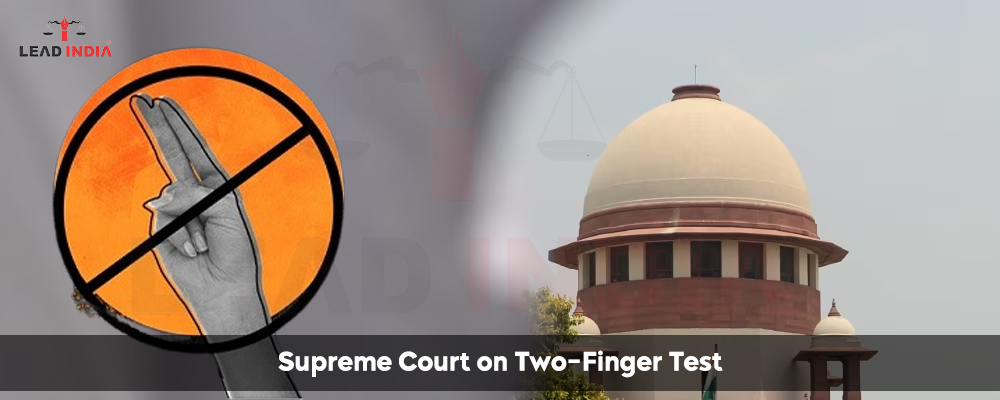In 2013, the Supreme Court deemed the two-finger test (commonly known as the ‘virginity test’ or the ‘per vaginum’ test) unlawful. It therefore declared that the test “violates the right of rape survivors to privacy, physical and mental integrity, and dignity.”
What is the Two-Finger test?
The two-finger test, performed by a medical practitioner, examines a woman’s vagina to determine if she has developed a sexual habit.
The practice is unscientific and produces no conclusive data. Furthermore, such ‘information’ is irrelevant to a rape allegation.
A woman who has been sexually attacked goes through a medical examination to determine her health and medical needs, as well as to collect evidence. The World Health Organisation (WHO) guide on dealing with sexual assault victims states, “There is no place for virginity (or ‘two-finger’) testing; it has no scientific validity.”
Need A Legal Advice
The internet is not a lawyer and neither are you. Talk to a real lawyer about your legal issue

Two-Finger Test
- In May 2013, the Supreme Court ruled that the two-finger test violates a woman’s right to privacy and urged the government to establish better medical procedures for confirming sexual assault. The Supreme Court, citing the International Covenant on Economic, Social, and Cultural Rights of 1966 and the United Nations Declaration of Basic Principles of Justice for Victims of Crime and Abuse of Power of 1985, stated that rape survivors are entitled to legal remedies that do not re-traumatize them or violate their physical or mental integrity and dignity.
- The Madras High Court ruled in April 2022 that the two-finger test should be banned.
- In the State of Jharkhand vs. Shailendra Kumar Case, 2022, a Supreme Court bench stated that “whether a woman is ‘habituated to sexual intercourse’ or ‘habitual to sexual intercourse’ is irrelevant for the purposes of determining whether the ingredients of Section 375 (rape) of the IPC are present in a particular case.”In this instance, the Supreme Court reiterated the two-finger test ban. The court ruled that it is patriarchal and unfair to suggest that a woman cannot be believed when she claims to have been raped just because she is sexually active.
- The current verdict on October 31, 2022, is noteworthy because it states that anyone who conducts a two-finger test on a victim in rape or penetrative sexual assault cases will be found guilty of misconduct. This begins to address the impunity of medical professionals who continue to use this technique.
The verdict emphasizes that “the two-finger test is based on the incorrect assumption that a sexually active woman cannot be raped… a woman’s sexual history is wholly immaterial while adjudicating whether The accused raped her.” It begins to send a message that the many repeated attacks on survivors’ character during trials, particularly those based on their sexual or relationship history, will no longer be permitted.
What do the government’s guidelines state?
Following the 2013 Justice Verma Committee recommendation on criminal law modifications for faster trials and enhanced punishment in sexual assault cases, the Union Health Ministry issued specific instructions for the medical evaluation of sexual assault victims in early 2014.
According to the recommendations, the ‘two-finger test’ should not be used to determine rape or sexual violence.
According to the standards, any medical examination must have the agreement of a rape victim (or her guardian, if she is a minor or mentally incompetent). Even if the victim does not provide consent, medical treatment cannot be denied. These are guidelines, not legally binding.
Way Forward
The instructions established by the Ministry of Health and Family Welfare should be distributed to both private and government hospitals. To prevent the test from being administered to rape survivors, health personnel should be trained in workshops. The problem can be solved by widespread sensitization and training of both doctors and police officers.
Lead India offers free legal advice and online information, in addition to other legal services. We provide a forum to speak with a lawyer and ask legal questions. Lead India’s solicitors can help you with any legal difficulties. Lead India’s solicitors may assist you with any legal issues. Lead India also provides free online legal help in India. In addition to giving online legal assistance, Lead India allows users to ask specialist questions for free.




 Talk to a Lawyer
Talk to a Lawyer